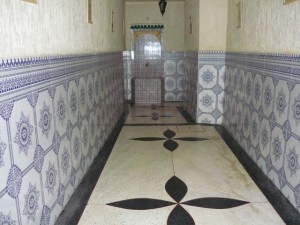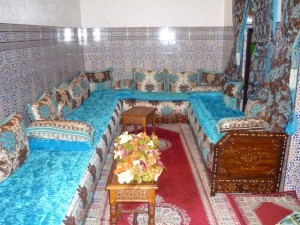My name is Chris Benson and I’m studying History/Sociology/Anthropology (people) at Loyola University Chicago. This summer I received a scholarship from the State Department to study Arabic abroad, and chose Morocco after the recommendation of professors as an exciting and fascinating country. They weren’t lying.
The adhan (call to prayer) begins with a single “Allahu Akbar!” blasting from the speakers of a nearby mosque. As other mosques join in, the call becomes a distorted hymn from the past, (think of the end of a psychedelic Beatles song.) At the same time, satellite dishes crowd the skyline of archaic buildings, and the French language has spread throughout the city. Rabat, Morocco is half contradiction, half anachronism, and entirely ideal for studying Arabic this summer through the Critical Language Scholarship Program (CLS).
I’ve spoken more Arabic these past few days in Rabat than I did in a semester in college. I’m still adjusting to immersion in the language, and have spent much of the past few days with the other American students. Culture shock hit me for the first time Monday, and I had the mantra of “country roads, take me home” for a few hours. Since then I’ve gained infinitely more confidence with my Arabic and ability to handle my situation, and will hopefully ease into more interaction with Moroccans. I live in the old medina (city), particularly in the suq (marketplace), where the streets are too narrow for cars and too winding for navigation.
In reality I’m studying two forms of Arabic here, darija and standard. Darija is the Moroccan Arabic dialect, and I spend about a fourth of my class time studying it as well as using it out on the streets. The other three fourths are dedicated to standard Arabic, which most Moroccans seem to understand though far fewer will reply with it. The two are not as different as Spanish or French are from Latin, but also not nearly as similar as British and American English, so we study them separately. Both standard and darija Arabic have become for the first time immediately useful to me for communication. There is not better answer to the question “why should I study?” than “You won’t be able to get home or eat or communicate.
I haven’t seen my host family much because I’ve spent so much time with Americans, and the family was preparing for their daughter’s wedding last Saturday (to be described in a future blog.) Of course, as Said’s (my host father and father of the bride) guests, my roommate Orion and I are attending. Said is a successful man with a successful man’s home. The house has its entrance at the end of a sketchy alley in the suq, but inside it’s a palace, with intricate tile work along all the walls and two rooms dedicated purely to decoratively embroidered couches for socializing. The family is considerate even while so busy, and we’re lucky that Said is dedicated to the study of standard Arabic and thus speaks and understands it well. Not to say that we can communicate with much proficiency. Orion is a far more serious and advanced student of Arabic than I and even he reflects that he must sound idiotic with his slow speech and limited vocabulary.
Studying Arabic here is only so rewarding because it is so challenging and disorienting, but I love it. I also have the chance to experience a culture that so far doesn’t make much of any sense. I won’t pretend to understand it, but I have noticed some sad bits. The adhan goes unanswered. God’s call is ignored while new idols (white, Western models) have become the modern ideals for emulation. The old medina seems like the most enduring traditional neighborhood, and for now its labyrinth has obstructed the infringing Western culture, (Western television, secularism, and technophilia) well as many of my attempts to return home. Even here, however, the hypnotic, desperate call to prayer is ignored for the necessities of business. (Colloquially, it’s like after a high school breakup where one person still texts the other several times a day, in vain.) It’s a constant reminder of the past being abandoned for a future where religion and tradition are placed on the backburner in favor of modernity.


